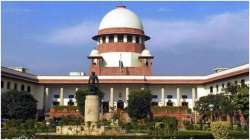Internet be restored for all 'essential services' in Kashmir, review of restrictions within 7 days, orders SC
In a significant ruling, the Supreme Court on Friday said that access to Internet is a fundamental right under Article 19 of the Constitution and asked the Jammu and Kashmir administration to review within a week all orders imposing curbs in the Union Territory. A five-judge bench headed by Justice N V Ramana also asked the J-K administration to restore Internet services in institutions providing essential services like hospitals and educational places.

In a significant ruling, the Supreme Court on Friday directed the administration of the Union Territory of Jammu and Kashmir (J&K) to view all its restrictive orders within a week and publish them publicly. The apex court called the restriction on Internet as against the Constitution. A bench headed by Justice N.V. Ramana said that Kashmir has seen a lot of violence and it will try its best to balance the human rights and freedoms with the issue of security. Reading out the judgement, it said, "It is no doubt that freedom of speech is an essential tool in a democratic set up. Freedom of Internet access is a fundamental right under Article 19(1)(a) of free speech."
Ordering the Jammu and Kashmir administration to restore Internet services in all institutions providing essential services like hospitals, educational centres, the apex court said internet services are intrinsic to right to free speech and cannot be suspended without providing reason and duration there of.
"Importance of internet cannot be underestimated and the internet as stool should be distinguished from FoE through internet. Internet is a major means of information therefore FoE through internet is part of Article 19(1)(a) and restrictions on it should be on accordance with restrictions to this right. Complete curb of internet must be considered by the State only as an extraordinary measure," The Supreme Court said.
The Supreme Court ordered the state government to review within 7 days all orders directing suspension of internet services and orders restoration of all government and local body websites where abuse of internet is minimal.
The court criticized the use of the colonial era Section 144, or a rule to ban large gatherings, in the former state that was bifurcated into two union territories as part of the government's decision to scrap Article 370. "It can't be used as a tool to oppress difference of opinion," Justice NV Ramana, while reading out the judgement, said.
A bench of Justice N V Ramana, Justice R Subhash Reddy and Justice B R Gavai had reserved the judgement on November 27 last year. On November 21, the Centre had justified restrictions imposed in Jammu and Kashmir after the abrogation of provisions of Article 370 and said that due to the preventive steps taken, neither a single life was lost nor a single bullet fired.
Besides Azad, the apex court had heard the petitions filed by Anuradha Bhasin, Executive Editor of Kashmir Times, and few intervenors questioning restrictions in the valley.
The Centre had referred to terror violence in the Kashmir Valley and said that for the past so many years terrorists were being pushed through from across the border, local militants and separatist organisation had held the civilians captive in the region and it would have been "foolish" if the government would not have taken preventive steps to secure the lives of citizens.
Provisions of Article 370, which gave special status to the erstwhile state of J&K, were abrogated by the Centre on August 5 last year.